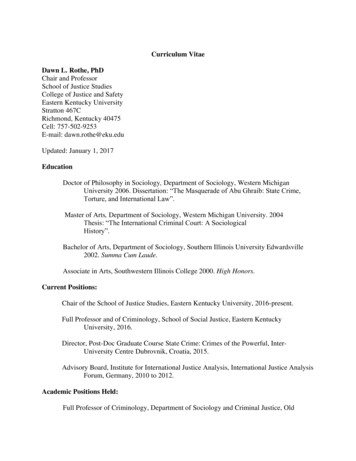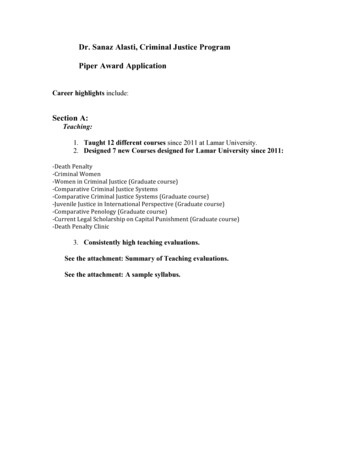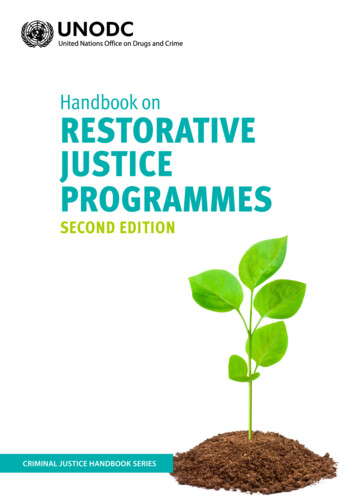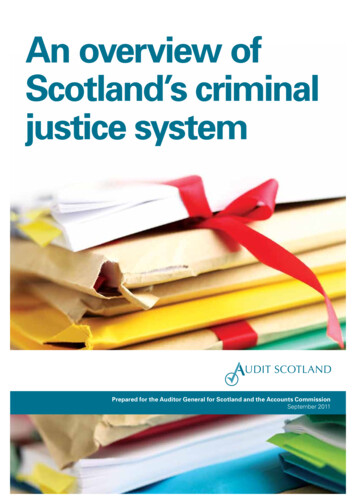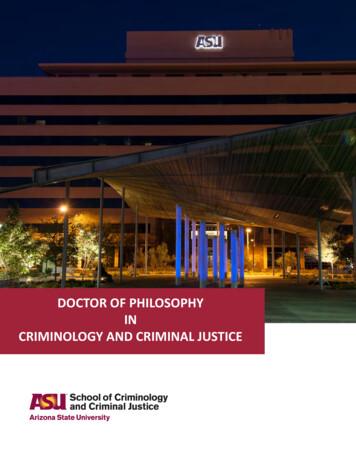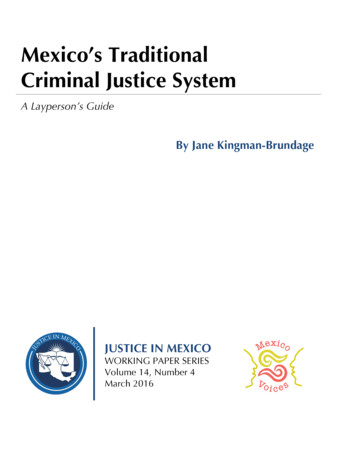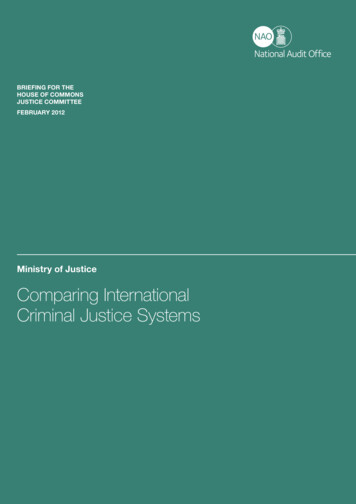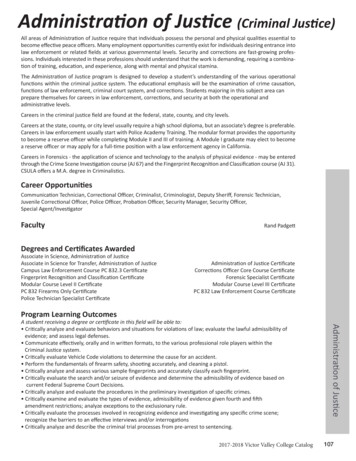
Transcription
Administration of Justice (Criminal Justice)All areas of Administration of Justice require that individuals possess the personal and physical qualities essential tobecome effective peace officers. Many employment opportunities currently exist for individuals desiring entrance intolaw enforcement or related fields at various governmental levels. Security and corrections are fast-growing professions. Individuals interested in these professions should understand that the work is demanding, requiring a combination of training, education, and experience, along with mental and physical stamina.The Administration of Justice program is designed to develop a student’s understanding of the various operationalfunctions within the criminal justice system. The educational emphasis will be the examination of crime causation,functions of law enforcement, criminal court system, and corrections. Students majoring in this subject area canprepare themselves for careers in law enforcement, corrections, and security at both the operational andadministrative levels.Careers in the criminal justice field are found at the federal, state, county, and city levels.Careers at the state, county, or city level usually require a high school diploma, but an associate’s degree is preferable.Careers in law enforcement usually start with Police Academy Training. The modular format provides the opportunityto become a reserve officer while completing Module II and III of training. A Module I graduate may elect to becomea reserve officer or may apply for a full-time position with a law enforcement agency in California.Careers in Forensics - the application of science and technology to the analysis of physical evidence - may be enteredthrough the Crime Scene Investigation course (AJ 67) and the Fingerprint Recognition and Classification course (AJ 31).CSULA offers a M.A. degree in Criminalistics.Career OpportunitiesCommunication Technician, Correctional Officer, Criminalist, Criminologist, Deputy Sheriff, Forensic Technician,Juvenile Correctional Officer, Police Officer, Probation Officer, Security Manager, Security Officer,Special Agent/InvestigatorFacultyRand PadgettDegrees and Certificates AwardedAssociate in Science, Administration of JusticeAssociate in Science for Transfer, Administration of JusticeAdministration of Justice CertificateCampus Law Enforcement Course PC 832.3 CertificateCorrections Officer Core Course CertificateFingerprint Recognition and Classification CertificateForensic Specialist CertificateModular Course Level II CertificateModular Course Level III CertificatePC 832 Firearms Only CertificatePC 832 Law Enforcement Course CertificatePolice Technician Specialist CertificateProgram Learning Outcomes2017-2018 Victor Valley College CatalogAdministration of JusticeA student receiving a degree or certificate in this field will be able to: Critically analyze and evaluate behaviors and situations for violations of law; evaluate the lawful admissibility ofevidence; and assess legal defenses. Communicate effectively, orally and in written formats, to the various professional role players within theCriminal Justice system. Critically evaluate Vehicle Code violations to determine the cause for an accident. Perform the fundamentals of firearm safety, shooting accurately, and cleaning a pistol. Critically analyze and assess various sample fingerprints and accurately classify each fingerprint. Critically evaluate the search and/or seizure of evidence and determine the admissibility of evidence based oncurrent Federal Supreme Court Decisions. Critically analyze and evaluate the procedures in the preliminary investigation of specific crimes. Critically examine and evaluate the types of evidence, admissibility of evidence given fourth and fifthamendment restrictions; analyze exceptions to the exclusionary rule. Critically evaluate the processes involved in recognizing evidence and investigating any specific crime scene;recognize the barriers to an effective interviews and/or interrogations Critically analyze and describe the criminal trial processes from pre-arrest to sentencing.107
Administration of Justice (Criminal Justice) Critically analyze and evaluate the proper procedures in conducting a criminal investigation involving crimes againstpersons, property, sex crimes, crimes against children, bombs and explosions, and vice and narcotics. Critically evaluate and analyze the development of the role players, training and education, and present day challenges of the criminal justice system to include police, courts, and corrections. Perform the duties and responsibilities of a Level II Reserve. Critically appraise the legal restraints imposed on a peace officer by the US Constitution; critically evaluate the dutiesand responsibilities of a Level III Reserve. Explain the sociological theories of criminology that relate specifically to juvenile delinquency. Recognize and explain the development of the Juvenile court system Recognize and explain the role of parens patriae and its role in the social development of the juvenile offender. Perform the duties, role, and function of a state certified correctional officer in a county jail or private prison.Autopsy Assistant Trainee ExamStudents who wish to take the Autopsy Assistant Trainee exam to seek positions as trainees or interns should take AJ 67,133, 145; ALDH 139; BIOL 211 (prerequisite: BIOL 100 or 107); and PHOT 101.Associate DegreeTo earn an Associate in Science degree with a major in Administration of Justice, complete a minimum of 18 units from any ofthe degree applicable certificate requirements or from any Administration of Justice courses (numbered 50 and above) andmeet all Victor Valley College graduation requirements. AJ 138 (Cooperative Education) may be used as elective credit but maynot be used to fulfill major requirementsTo earn an Associate in Science degree for Transfer with a major in Administration of Justice, complete the required majorcourses and all other requirements specified on the following pages (ie. 60 CSU transferable units, CSU GE or IGETC, etc). Formore information on the AA-T/AS-T degrees, meet with a counselor or go to www.adegreewithaguarantee.comTransferFor the most up-to-date information on these programs and others, visit www.assist.org. Please stop by the Transfer Centerin Building 55 or make an appointment with a counselor if you have questions. California State University, San Bernardino: Criminal Justice majorLocal Bachelors ProgramsAdministration of JusticeFor information on the following programs located in the High Desert, please visit www.vvc.edu/offices/transfer-center andselect “Counseling Information Sheets”: Brandman University, Victor Valley Campus: Criminal Justice major University of La Verne, High Desert Campus: Criminal Justice major (Online)1082017-2018 Victor Valley College Catalog
Administration of Justice (Criminal Justice)Administration of Justice, AS-T (04967)The program leading to the Associate in Science for Transfer in Administration of Justice is designed to acquaint pre-service and in-service students with theprinciples and practices of criminal justice systems in America.Students will be prepared to work in a variety of fields, including: public law enforcement agencies such as municipal police, probation officers, county deputysheriffs, correction- al officers, game wardens, state parks, and private security.Students completing the AS-T in Administration of Justice will be able to transfer to the California State University system and be prepared to study in thefollowing areas: Administration of Justice, Law Enforcement, Correctional Science, Social Science/Criminology, Forensics, and Pre-Law.Major Requirements: 18-19 unitsRequired Courses (6 units total):AJ 101Introduction to Administration of Justice3.0AJ 103Criminal Law3.0Additional CoursesList A – Select any TWO of the following courses (6 units total)AJ 102Criminal Procedures3.0AJ 104Legal Aspects of Evidence3.0AJ 132Introductions to Corrections3.0AJ 135Juvenile Law and Procedures3.0AJ 145Introduction to Criminal Investigation3.0AJ 150Introduction to Forensic Science3.0AJ 201Community and the Justice System3.0List B – Select any TWO of the following courses (6 units total)Introductory to Psychology3.0PSYC 101HHonors to Introductory Psychology3.0SOC 101Introduction to Sociology3.0MATH 120Introduction to Statistics4.0MATH 120HHonors Introduction to Statistics4.0GEOG 101Physical Geography3.0GEOG 101LGeography Lab1.0GEOG 102Introduction to Cultural Geography3.0POLS 130Introduction to Paralegal Studies3.0BADM 101Financial Accounting4.0BADM 103Financial Accounting Fundamentals3.0BIOL 211Human Anatomy4.0CIS 101Computer Literacy4.0OR, any CSU transferable Administration of Justice lower division course, OR, courses outside of the Administration of Justice discipline that are articulatedas lower division major preparation for the Criminal Justice/ Criminology major at any CSU.A student wishing to pursue an AA-T/AS-T degree in the major listed on this page must ensure the CSU of their choice is accepting that similar major. Students completing an AA-T/AS-T degree are guaranteed admissions into a CSU campus given that a student fulfills the following:1) 60 CSU transferable units;2) Completes the CSU General Education (GE) or IGETC General Education pattern;3) Completes the major requirements for the AA-T/AS-T;4) Maintains a transferable cumulative GPA of at least 2.0 (C or better);5) Completes the basic/Golden 4 GE requirements;For more information on the AA-T/AS-T degrees, meet with a counselor or visit www.adegreewithaguarantee.com2017-2018 Victor Valley College CatalogAdministration of JusticePSYC 101109
Administration of Justice (Criminal Justice)ADMINISTRATION OF JUSTICE CERTIFICATE OF ACHIEVEMENT (20548)Prepares the student for a variety of employment opportunities within the Criminal Justice System. Employment opportunities include Corrections, Law Enforcement, Traffic Enforcement, Probation, Parole, Security, Prevention Loss officer,and related Social Worker positions.Units Required: 24.0All of the following must be completed:AJ 92Writing for Criminal Justice3.0AJ 93Traffic Enforcement and Investigation3.0AJ 101Introduction to Administration of Justice3.0AJ 102Criminal Procedures3.0AJ 103Criminal Law3.0AJ 104Legal Aspects of Evidence3.0AJ 127Introduction to Criminology3.0AJ 201Community and the Justice System3.0CAMPUS LAW ENFORCEMENT COURSE: PC 832.3 CERTIFICATE OF CAREERPREPARATIONUnits Required: 2.0AJ 8PC 832.3 Campus Law Enforcement2.0CORRECTIONS OFFICER CORE COURSE CERTIFICATE OF CAREER PREPARATIONPrepares the student to meet the legal requirements established by Standards and Training for Corrections (STC), in orderto be employed as a city or county correctional officer.Units Required: 8.0AJ64Basic CorrectionsOfficer ICATION CERTIFICATE OF CAREER8.0Units Required: 2.5AJ 31Fingerprint Recognition and Classification2.5FORENSIC SPECIALIST CERTIFICATE OF CAREER PREPARATIONThis certificate meets the standards required of a Forensic Specialist whose duties include processing evidence at crimescenes, packaging and transporting evidence to a crime lab, and testifying in court. The certificate requirements meet thestandards set by the Commission on Peace Officer Standards and Training and the College Advisory Committee.Units Required: 3.5Administration of JusticeAJ 67110Crime Scene Investigation3.5LAW ENFORCEMENT MODULE III BASIC COURSE CERTIFICATE OF CAREER PREPARATIONThis certificate will be awarded to students who have successfully completed the Level III Modulated Course. This courseis certified by the Commission on Peace Officer Standards and Training.Units Required: 6.5AJ 80Module Law Enforcement Basic Course2017-2018 Victor Valley College Catalog6.5
Administration of Justice (Criminal Justice)LAW ENFORCEMENT MODULE II BASIC COURSE CERTIFICATE OF CAREERPREPARATIONThis certificate will be awarded to students who have successfully completed the Level II Modulated Course. This courseis certified by the Commission on Peace Officer Standards and Training.Units Required: 15.5AJ 80Module III Law Enforcement Basic Course6.5AJ 81Module II Law Enforcement Basic Course9.0PC 832 FIREARMS ONLY CERTIFICATE OF CAREER PREPARATIONUnits Required: 0.5AJ 30Firearms Training0.5PC 832 LAWS OF ARREST COURSE CERTIFICATE OF CAREER PREPARATIONPrepares the student to meet the minimum requirements as a non-designated Level III Reserve Peace Officer, or, as adesignated limited-duty peace officer. This certificate program complies with the Commission on Peace Officer Standardsand Training.Units Required: 3.0AJ 58PC 832 Laws of Arrest3.0POLICE TECHNICIAN SPECIALIST CERTIFICATE OF CAREER PREPARATIONPrepares the student for a variety of employment opportunities with any Law Enforcement Agency, in a civilian capacity,as a Forensic Specialist or as an Evidence Technician.Units Required: 15.5AJ 92Writing for Criminal Justice3.0AJ 93Traffic Enforcement and Investigation3.0AJ 103Criminal Law3.0AJ 140Communication Skills for Interviewing and Interrogation3.0AJ 67Crime Scene Investigation3.5Administration of Justice2017-2018 Victor Valley College Catalog111
Administration of Justice (Criminal Justice) CoursesAJ 8.0 PC 832.3 CAMPUS LAW ENFORCEMENTUnits: 2.032-36 hours lecture(No Prerequisite. Pass/No Pass) This course does not apply to the Associate Degree.This course complies with the state requirements for K-12 and Community College peace officer training per Penal Code832.3g, certified by the State Commission on Peace Officer Standards and Training. This course includes the role and responsibilities of campus police, search and seizure, student discipline and records, crimes against persons and property,mandatory reporting of child abuse, and disaster preparedness.AJ 25 PUBLIC SAFETY DISPATCHERUnits: 5.580-90 hours lecture and 24-27 hours laboratory(No Prerequisite. Pass/No Pass) This course does not apply to the Associate Degree.This course complies with the Commission on Peace Officer Standards and Training (POST) requirements for Public SafetyDispatchers. This course includes the criminal justice system, criminal law, communication technology, telephone andradio procedures, missing persons, domestic violence, cultural diversity, sexual harassment, gang awareness, emergencymedical services and stress management.AJ 30 PC 832 FIREARMSUnits: 0.524-27 hours laboratory(Prerequisite. All students must have a DOJ criminal record clearance, in writing through NLETS, CLETS and FBI databases.Pass/No Pass) This course does not apply to the Associate Degree.This course satisfies the Commission on Peace Officer Standards and Training (POST) firearms certification for the Level IIIreserve and PC 832. Additionally, this course exceeds the State of California firearms safe handling and use certificationrequired from any person purchasing a firearm in California.AJ 31 FINGERPRINT RECOGNITION AND CLASSIFICATIONUnits: 2.540-45 hours lecture(No Prerequisite. Pass/No Pass) This course does not apply to the Associate Degree.This course is designed to give instruction and training to a person without any prior knowledge in fingerprint classification. Every person who successfully completes this course will be able to recognize and identify a known fingerprint andhave the skills to recognize and identify an unknown fingerprint to known fingerprint.AJ 58 PC 832 LAWS OF ARRESTUnits: 3.040-45 hours lecture(No Prerequisite. Pass/No Pass)This course complies with the requirements of the Commission on Peace Officers Standards and Training (POST) forcertification in PC 832. This course includes professionalism, law, evidence, investigation, arrest methods and control,community relations, and communication skills for interviewing and interrogation.Administration of JusticeAJ 64 BASIC CORRECTIONS OFFICER ACADEMY112Units: 8.0112-126 hours lecture and 48-54 hours laboratory(No Prerequisite. Pass/No Pass)This course satisfactorily meets the requirements of section 1020 of the California Administrative Code, Minimum JailStandards and the Basic Jail/Adult Institution requirements of the STC program.AJ 67 CRIME SCENE INVESTIGATIONUnits: 3.548-54 hours lecture and 24-27 hours laboratory(No prerequisite)This course concentrates on the technical aspects of evidence collection, crime scene reconstruction, crime scene photography, evidence packaging, and court room testimony. The student is prepared to distinguish between trace, stain, andimpression evidence and the role of these types of evidence in criminal investigations.2017-2018 Victor Valley College Catalog
Administration of Justice (Criminal Justice) CoursesAJ 80 MODULE III LAW ENFORCEMENT BASIC COURSEUnits: 6.580-90 hours lecture and 72-81 hours laboratory(Prerequisite: Department of Justice criminal record clearance for firearms (State Mandated). Pass/No Pass)This course complies with the Commission on Peace Officers Standards and Training (POST) requirements for the ModuleIII Law Enforcement Basic Course. This course includes professionalism and ethics; criminal law; laws of arrest and searchand seizure; report writing, vehicle operations; use of force and force options; chemical agents; and firearms training.AJ 81 MODULE II LAW ENFORCEMENT BASIC COURSEUnits: 9.0120-135 hours lecture and 96-108 hours laboratory(Prerequisites: AJ 80 and Department of Justice criminal record clearance for firearms. Must have completed Module IIIwithin three years and passed the End of Course Final Exam within one year. Pass/No Pass.)This course includes community relations; victimology; crimes against property and persons; crimes against children;specific sex crimes; search and seizure law; investigative report writing; crimes in progress and patrol tactics; use of force;defensive tactics; and firearms training.AJ 92 WRITING FOR CRIMINAL JUSTICE (Formerly AJ 133)Units: 3.048-54 hours lecture(No prerequisites)Techniques of communicating facts, information, and ideas effectively in a simple, clear and logical manner in the varioustypes of criminal justice system reports: letters, memoranda, directives, and administrative reports with an emphasis oncriminal justice terminology in note taking and report writing.AJ 93 TRAFFIC ENFORCEMENT AND INVESTIGATION (Formerly AJ 126)Units: 3.048-54 hours lecture(No prerequisites)A study of the fundamentals of accident investigation and reconstruction employing the principles of crime scene initialsurvey, evidence collection, skid mark analysis, and interviewing techniques. Includes the study and application of theCalifornia Vehicle code and CHP traffic collision manual.AJ 101 INTRODUCTION TO THE ADMINISTRATION OF JUSTICEUnits: 3.0CSU, UC 48-54 hours lecture(No prerequisites)This course introduces students to the characteristics of the criminal justice system in the US. Focus is placed on examining crime measurement, theoretical explanations of crime, responses to crime, components of the system, and currentchallenges to the system. This course will examine the evolution and practices of the police, courts, corrections and theirrespective role players. This course will examine the ethics, education and training requirements for the respective roleplayers in the criminal justice system.Units: 3.0CSU 48-54 hours lecture(No prerequisites)Legal processes from pre-arrest through trial, sentencing and correctional procedures. An analysis of ethical decisionsmade by police, prosecutors, defense attorney, and the judiciary; conceptual interpretations of criminal trial procedurallaw as reflected in court decisions. A study of case law methodology and case research as the decisions impact upon theprocedures of the justice system.2017-2018 Victor Valley College CatalogAdministration of JusticeAJ 102 CRIMINAL PROCEDURES113
Administration of Justice (Criminal Justice) CoursesAJ 103 CRIMINAL LAWUnits: 3.0CSU, UC 48-54 hours lecture(No prerequisites)This course offers an analysis of the doctrines of criminal liability in the United States and the classification of crimesagainst persons, property, morals, and public welfare. Special emphasis is placed on the classification of crime, generalelements of crime, the definitions of common and statutory law, and the nature of acceptable evidence. This course utilizes case law and case studies to introduce students to criminal law. The completion of this course offers a foundationupon which upper-division criminal justice course will build. This course also includes criminal culpability and defensesto crimes.AJ 104 LEGAL ASPECTS OF EVIDENCEUnits: 3.0CSU 48-54 hours lecture(No prerequisites)Origin, development, philosophy, and constitutional basis of evidence; constitutional and procedural considerations affecting arrest, search, and seizure; kinds and degrees of evidence and rules governing admissibility and exclusion; judicialdecisions interpreting individual rights and case studies viewed from a conceptual level.AJ 127 INTRODUCTION TO CRIMINOLOGYUnits: 3.0CSU, UC 48-54 hours lecture(No prerequisites)An introduction to major types of criminal behavior, characteristics of offenders, factors which contribute to crime anddelinquency. An examination of the criminal justice process; the function of law enforcement, the courts, probation, parole and institutions. Explore the changes in crime control and treatment processes, the role of society.AJ 130 DEATH INVESTIGATIONUnits: 3.0CSU 48-54 hours lecture(No prerequisites)A course designed to prepare the law enforcement officer with the appropriate knowledge and techniques for handlinghomicide investigations.AJ 132 INTRODUCTION TO CORRECTIONSUnits: 3.0CSU 48-54 hours lecture(No prerequisites)Administration of JusticeA survey of the field of correctional science. Historical development, current concepts and practice; explanations ofcriminal behavior; functions and objectives of the criminal justice system concerned with institutional, probation, andparole processes as they modify the offender’s behavior; survey of professional career opportunities in public and privateinstitutions.114AJ 135 JUVENILE LAW AND PROCEDURESUnits: 3.0CSU 48-54 hours lecture(No prerequisites)An overview and history of the Juvenile Justice System that evolved in the American Justice System. This course examinesthe sociological theories of delinquency, constitutional rights of juveniles, investigative procedures regarding juveniles,and the judicial proceedings of juveniles from intake to custodial resolutions.AJ 138 COOPERATIVE EDUCATIONSee Cooperative Education listing (1-8 units)2017-2018 Victor Valley College CatalogCSU
Administration of Justice (Criminal Justice) CoursesAJ 140 COMMUNICATION SKILLS FOR INTERVIEWING AND INTERROGATIONUnits: 3.0CSU 48-54 hours lecture(No prerequisites)The course will focus on the technical and legal aspects of interview and interrogation within the Administration of Justicesystem. It will provide the student with the communication skills required to elicit reliable and admissible informationfrom witnesses and suspects. Constitutional and Legislative law will be emphasized.AJ 145 INTRODUCTION TO CRIMINAL INVESTIGATIONSUnits: 3.0CSU 48-54 hours lecture(No prerequisites)This course explores the techniques, procedures, and ethical issues in the investigation of crime, including organization ofthe investigative process, crime scene searches, interviewing and interrogating, surveillance, source of information, utilityof evidence, scientific analysis of evidence and the role of the investigator in the trial process.AJ 148 SPECIAL TOPICSSee Special Topics listing (Variable units)CSUAJ 149 INDEPENDENT STUDYSee Independent Study listing (1-3 units)CSUAJ 150 INTRODUCTION TO FORENSIC SCIENCEUnits: 3.0CSU 48-54 hours lecture(No prerequisites)This course introduces the role of forensics in the criminal justice system. The course includes: crime scene processes andanalysis; interpretation of patterns for reconstruction; physical pattern evidence; fingerprint identification and patterns;questioned document examination; tool marks and firearms examination; biological evidence and DNA; arson and explosives evidence, and drug analysis.AJ 201 COMMUNITY AND THE JUSTICE SYSTEMUnits: 3.0CSU 48-54 hours lecture(No prerequisites)This course examines the complex, dynamic relationship between communities and the justice system in addressingcrime and social conflict with an emphasis on the challenges and prospects of administering justice within a diversemulticultural population. Topics may include ethics, consensus and conflicting values in culture, religion, and law. CSU.Administration of Justice2017-2018 Victor Valley College Catalog115
Recognize and explain the development of the Juvenile court system Recognize and explain the role of parens patriae and its role in the social development of the juvenile offender. Perform the duties, role, and function of a state certified correctional officer in a county jail or private prison. Autopsy Assistant Trainee Exam

